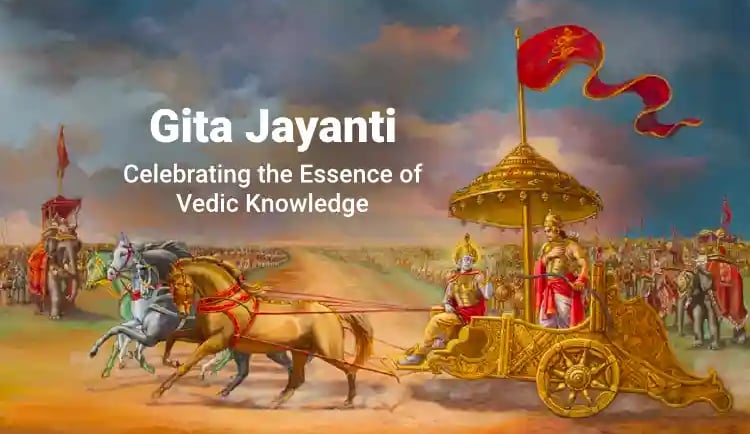The Importance of Gita Jayanti: Celebrating the Timeless Wisdom of the Bhagavad Gita
The Importance of Gita Jayanti: Celebrating the Timeless Wisdom of the Bhagavad Gita
LATEST NEWSPERSONAL GROWTH
12/11/20243 min read
Gita Jayanti, the celebration of the birth of the Bhagavad Gita, is one of the most significant occasions in the Hindu calendar. This auspicious day falls on the 11th day of the waxing moon in the month of Margashirsha (November-December), commemorating the day when Lord Krishna imparted the profound teachings of the Gita to the warrior prince Arjuna on the battlefield of Kurukshetra.
The Bhagavad Gita is not just a religious scripture but a timeless guide for living a purposeful, meaningful, and righteous life. Celebrating Gita Jayanti is an opportunity to reflect on its spiritual, philosophical, and moral teachings and apply them to modern-day challenges.
The Spiritual Significance of Gita Jayanti
The Bhagavad Gita, often referred to simply as the Gita, contains 700 verses that cover a wide range of topics, from the nature of the self (Atman) to the path to ultimate liberation (Moksha). It is a conversation between Lord Krishna and Arjuna, where Krishna, the divine incarnation, imparts deep wisdom and guidance on how to live a life of righteousness (Dharma), devotion (Bhakti), and selfless action (Karma).
On Gita Jayanti, devotees come together to recite these teachings, meditate upon them, and reflect on how the Gita’s wisdom can help them navigate the complexities of life. The day serves as a reminder of the eternal values of truth, compassion, duty, and righteousness.
Spiritual Reflection and Personal Growth
One of the main reasons Gita Jayanti is so significant is the opportunity it provides for spiritual reflection. On this day, many people take time to read the Bhagavad Gita, meditate on its verses, or attend special pujas and discourses organized in temples and community centers. By doing so, they seek to deepen their understanding of their own lives and reconnect with the divine teachings that guide them.
Lord Krishna’s teachings encourage self-awareness, discipline, and devotion, offering practical advice on how to lead a balanced life amid the ups and downs of everyday existence. His advice on surrendering to the divine will, letting go of ego, and acting with a sense of detachment from the results of actions is powerful and relevant to contemporary life.
Gita Jayanti as a Day for Selfless Service
In many communities, Gita Jayanti is not only a day for personal reflection but also a time for engaging in acts of selfless service. The Gita teaches the importance of performing one’s duties (Karma) without attachment to the outcomes, and many devotees use this occasion to offer their time and resources to charity, helping others in need. Acts of kindness, feeding the hungry, supporting social causes, or providing help to the less fortunate are often part of the celebrations.
The Universal Relevance of the Bhagavad Gita
Though the Bhagavad Gita was spoken thousands of years ago, its teachings transcend time and culture. The principles of Dharma (righteousness), Karma (action), Bhakti (devotion), and Jnana (knowledge) are universal, making the Gita relevant to people of all backgrounds and beliefs. It addresses core human struggles such as doubt, fear, moral dilemmas, and the pursuit of inner peace, offering solutions that remain applicable in modern times.
Gita Jayanti is a reminder that these teachings are not confined to religious rituals but are practical tools for living a harmonious, purposeful life. It inspires individuals to live ethically, act responsibly, and devote themselves to a higher purpose.
How Gita Jayanti is Celebrated
The celebrations of Gita Jayanti vary across regions and communities, but the underlying theme is devotion to the teachings of the Bhagavad Gita. Some of the common practices include:
Reciting the Bhagavad Gita: Devotees often gather to chant verses from the Gita, either individually or in groups, to absorb the wisdom contained in the text.
Gita Recitation Competitions: In many places, recitation of verses is done in the form of competitions, encouraging people of all ages to memorize and share the teachings of the Gita.
Pujas and Discourses: Temples and spiritual organizations host special prayers, pujas, and talks by revered spiritual leaders to explain the significance of the Gita’s teachings.
Charity and Service: Many choose to perform charitable acts or volunteer their time to serve others, reflecting the Gita’s teaching of selfless service.
Gita Jayanti is much more than just a religious celebration; it is a reminder of the enduring wisdom of the Bhagavad Gita, which continues to inspire and guide millions around the world. On this day, we are reminded of the importance of aligning ourselves with righteousness, acting selflessly, and cultivating a deep connection with the divine. The Gita teaches that by following the path of devotion, action, and knowledge, we can achieve lasting peace, wisdom, and fulfillment.
Whether through meditation, recitation, or acts of service, Gita Jayanti offers us an opportunity to reflect on the timeless lessons of the Gita and integrate them into our daily lives, enriching our spiritual journey and strengthening our connection to the world around us.
The Prime Chronicle © 2024
Stay Inspired
Get fresh wellness tips straight to your inbox
We care about your data in our privacy policy.


